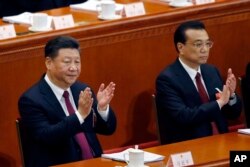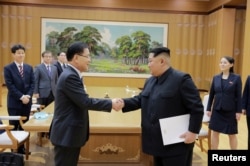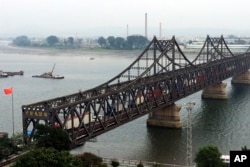China is voicing support for the possible U.S.-North Korea summit, despite concerns that it will be left out of talks that could dramatically alter regional security and political dynamics.
U.S. President Donald Trump surprised the world last week when he agreed to accept North Korean leader Kim Jong Un’s offer to meet about ending Pyongyang’s nuclear weapons program.
The rapid turn toward diplomacy could defuse building tensions over the North’s accelerated testing of missile and nuclear devices to develop a nuclear-armed long- range missile that can target the U.S. mainland.
The Trump administration has led a “maximum pressure” campaign that imposed tough sanctions on Pyongyang, and planned for possible military action, if needed, to force the Kim government to give up its nuclear program.
Chinese support
Chinese President Xi Jinping said he was delighted with the progress being made to reduce regional tensions and facilitate direct talks between Trump and Kim.
The Chinese leadership has closely consulted the U.S. and South Korea on the prospects of talks. Lu Chao, a North Korea expert at the Liaoning Academy of Social Science in China said Beijing has nothing to fear from being left on the sidelines of the upcoming summit between Washington and its ally in Pyongyang.
“Beijing’s role will not be diminished. Neither will China’s interests be compromised if the U.S. engages in direct talks with the North Koreans,” said Lu.
The Global Times, China’s Communist Party newspaper, also reacted to the prospect of a Trump/Kim summit by urging the Chinese people to “avoid the mentality that China is being marginalized.”
Also anxiety
Yet other China scholars in the region worry that Trump’s diplomatic initiative could undermine Beijing’s influence and further strain already tense relaxations between Xi and Kim.
“There is evidently anxiety on the progress being made in the absence of its [China’s] influence all of a sudden,” said Seo Jeong-kyung, a professor with the Sungkyun Institute of China Studies in Seoul.
North Korea has still not reacted to Trump’s response, nor confirmed the offer for a summit that was communicated though a South Korean envoy that met with Kim in Pyongyang.
If the summit does happen, Trump would be the first head of state who Kim Jong Un will meet since he came to power in 2012. The North Korean leader has yet to meet with Chinese President Xi.
Even though North Korea is dependent on China for over 90 percent of its trade, relations between the two allies has been strained over Pyongyang’s nuclear program. The young leader of North Korea has also not cultivated friendly ties with China, and has repeatedly ignored Beijing’s calls for Pyongyang to refrain from provocative missile and nuclear tests.
In contrast, Kim Jong Il, the father of the current North Korean leader, often visited with the leaders in Beijing, despite his own disagreement with China over nuclear weapons. In the 2000s China led six party talks - that included the U.S., North Korea, South Korea, Japan, and Russia — to reach a denuclearization deal. But in 2009 Kim Jong Il walked away from these talks to resume his country’s nuclear development program.
President Xi’s frustration with past failure and with the young North Korea leader may also be part the reason why Beijing is willing to sit out the denuclearization talks this time.
“China wants to play some role, but the greatest obstacle is Kim Jong Un’s hostility against China," said Shi Yinhong, a political science professor at Renmin University in Beijing.
Improving U.S.-North Korea relations could further estrange Kim from Xi. With a nuclear deal in place, the Trump administration would no longer need Beijing’s support on sanctions and could take a more confrontational approach to deal with Chinese trade issues and to counter Chinese aggression in the South China Sea.
Aligned benefits
For China, there are clear benefits to a North Korea nuclear deal. It would reduce the potential for conflict in the region and restore expanding cross border economic activity.
Rather than lead to confrontation with the U.S. on other issues, there is also speculation that Beijing could leverage its support of U.S. led sanctions to end Washington’s objections to China’s claims in the South China Sea, or to the “One China Principle” on Taiwan.
“There have been discussions about trying to obtain the cooperation of the U.S. to unify Taiwan into China, after securing a good deal with the U.S. on the North Korea issue,” said Seo Jeong-kyung, with the Sungkyun Institute of China Studies.
A nuclear deal would also increase pressure on the United States and South Korea to reduce their military presence and remove the THAAD missile defense shield that was deployed on South Korea last year.
Lee Yoon-jee contributed to this report from Seoul.


















